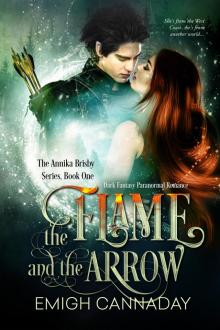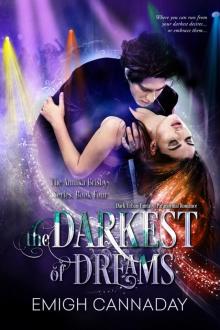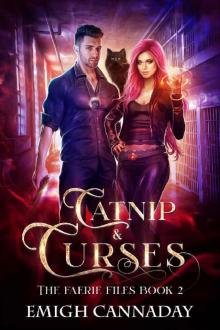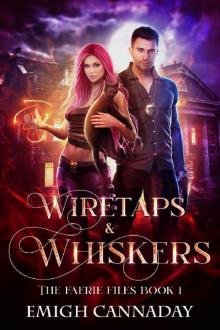- Home
- Emigh Cannaday
Wiretaps & Whiskers (The Faerie Files Book 1) Page 6
Wiretaps & Whiskers (The Faerie Files Book 1) Read online
Page 6
“I don’t think it’s anything occult or paranormal,” I said, firmly. “And neither should you. You’re a man of the law. Don’t you think child abductions require a bit more critical thinking, instead of assuming it’s the work of faeries or witches?”
McKinney crossed his arms and looked at me dead in the face. So much for making nice with the guy.
“Sure . . . ” he said, unable to hide the bitterness in his voice. “Some things require critical thinking. But some things, as you’re about to discover, fall beyond the realm of logic.” He turned to Rivera. “How did a goon like him end up in the Occult Crimes Division, anyway?”
“It wasn’t my choice,” Rivera said without looking up.
“Don’t you have to believe in the things you investigate?”
“That’s what I used to think,” huffed Rivera, turning the page of her book. “But he only started yesterday morning. He’s got a lot to learn.”
“Yesterday morning?” laughed McKinney. “I don’t fucking believe it. I thought the FBI was sending the cream of the crop.”
I clenched my jaw, keeping my frustration in check. I was the cream of the crop. That’s why Harris had chosen me for this assignment. I realized I wasn’t going to make any friends with my current outlook, but at the same time, there was no way in hell I was going to drink whatever Kool-Aid McKinney and Rivera were chugging. Without proof, I didn’t believe anything. Maybe it was time to change my approach. Just a little. Try and at least pretend I was interested in learning about all things occult and paranormal.
“Sheriff McKinney,” I began, pulling out my notebook so I at least appeared interested. “You’ll have to forgive me. I’m a city boy. Given what kids are wearing these days,” my eyes darted over to Rivera’s hot pink hair and ripped jeans, “I probably wouldn’t recognize a faerie if it was standing right in front of me. I hope you’ll cut me some slack and help teach me whatever you know about the paranormal.”
“Well, I can’t tell you everything.” His tone was begrudging, but he’d taken the bait. Good. “We’d be here for a lifetime. I can, however, tell you what I know about what’s happening here in Yarbrough. I can tell you a whole lot because it’s been happening long before Yarbrough was even called Yarbrough.”
“That would be great,” I said, nodding my head as I scribbled in my notebook. “So you’re a bit of a historian?”
“You could say that,” he nodded. “But a lot of us here are. The history of this area is rich in legend. We all grew up hearing the stories from our grandparents that they heard from their own grandparents.”
He relaxed a bit as he spoke and stood up to walk over to the coffeemaker, topping off his mug. Then he moved into the top drawer of his desk. I expected him to pull out a bottle of whiskey or even a mason jar of moonshine, but instead, he presented us with a package of soft molasses cookies. Rivera’s eyes widened like a cat’s when she saw them.
“Don’t tell Martha,” he said, offering me a cookie before taking one for himself. “She’ll have kittens if she finds out I’m back on the carbs.”
Clearly unconcerned about her own carb intake, Rivera practically lunged at the package, coming away with three in one hand, and another in her mouth.
“Wow, hungry?” laughed McKinney.
“For molasses cookies? Always.”
I tried to ignore her talking with her mouth full, but she didn’t seem to mind making a spectacle of herself. She took her time licking the crumbs off her fingers, swirling her pink tongue around each tip. Good god. Did she have any idea how sexually suggestive that came across? Maybe. Did she even care?
Hmmm . . .
Shaking some inappropriate thoughts from my mind, I doubled down on trying to focus on my notes.
“Right. The history of Yarbrough,” I blurted out, eager to get back on topic. “You said you know a lot about it. Is there any of it’s that relevant to the missing children?”
A solemn expression fell across McKinney’s face as he lowered himself down into his seat with a groan.
“Where should I start?”
“Wherever you want. I prefer the beginning.”
He placed a cookie into his mouth and began chewing thoughtfully.
“Well then . . . The very beginning was thousands of years ago for Yarbrough. That’s what the legend says anyway.”
“There’s a legend?”
“Uh huh. A Native American one. Cherokee, to be precise.” Without turning around, he motioned out the window to the nearest peak. “Up there on that mountain there’s a cave full of paintings. Weird paintings of little people coming out of the ground. Every generation’s got stories of kids being taken by these little people.”
“Is there any evi—any record of these earlier occurrences that we can review?”
“Sorta,” McKinney shrugged. “The thing is . . . all the Native American’s history is oral. That’s how they passed it along from one generation to the next, was tellin’ stories. It wasn’t until settlers started showing up that people started writing things down. There’s an old newspaper clipping somewhere that talks about pioneer children disappearing. One minute they’d be playing near their covered wagon . . . and the next they’d be gone. They blamed it on the Cherokee, but later on, after they’d all been run off their land and put on reservations, the kids kept vanishing.”
Rivera had finished her cookies and miraculously waited until she’d swallowed her food before she began to speak.
“I don’t understand,” she said, confused. “If children kept disappearing from this area, why was nothing done sooner? Wasn’t this investigated?”
“Now you’re getting somewhere . . . ” McKinney’s bushy eyebrows lifted as if to impart some deep wisdom. “Some big shots from Washington came out back in the nineties, but nothing happened. Seems Uncle Sam doesn’t care what happens to a bunch of broke-ass, backwoods rednecks. Course . . . if it happened in Beverly Hills, you bet there’d be some answers by now.”
There was no arguing with that.
“Besides . . . ” He leaned back in his chair, propping his feet up on the edge of his desk. “The disappearances weren’t constant. And they weren’t predictable, either. In one year it could be one child, then there would be no disappearances for a decade. Then suddenly there would be three in a weekend, then none for twenty years. We knew nothing of how to deal with these disappearances. Only that they were happening when we least expected it.”
“Alright,” I paused to write more notes. “How long have you been in the Yarbrough Police Department?”
“It’ll be thirty-three years next summer. But I know what you’re going to ask me.” I caught his gaze, waiting for him to speak. “You’re going to ask how many missing children’s cases I’ve dealt with in my career.” I gave him a faint smile and nodded my head. “The answer is that until this recent spate I only dealt with two. Two in three decades, then suddenly there were hundreds. I’m at the end of my tether, Agent Hawthorne. There’s not much more we can do here without the resources. That’s why we need you guys.”
The man truly believed what he was saying, but I was struggling to feel his enthusiasm for the old local stories. Cave paintings? Little people? It all sounded like folklore to me. Not real life.
“Agent Hawthorne. You’re looking at me like I’m talking nonsense.”
“No, sir. Not at all.”
“I can see there’s a part of you who thinks none of this could really be happening. That us country folk are just imagining it all. I guess to a certain extent that’s healthy. But if you want to become a believer, I suggest you go visit some of the parents yourself.”
“Actually,” interjected Rivera. “I was thinking our first visit should be to the Brown family. I’ve watched Haley’s interview. It’s pretty compelling stuff.”
“Indeed,” McKinney agreed. “But I better warn you. The Brown family ain’t the friendliest to outsiders.”
6
Elena
Sheriff McK
inney wasn’t kidding when he said the Browns were suspicious of outsiders. We’d barely made it halfway down the driveway when Mrs. Brown stepped out onto her porch with a shotgun in her hands.
“Who are you?” she bellowed through the misty air. Hawthorne stepped on the brakes and I leaned out the window, flashing her a disarming smile.
“FBI,” I called back cheerfully, raising my badge at her.
Slowly, she lowered her gun and motioned for us to continue driving up to the house.
“You don’t look like FBI,” she said when we got out of the car. She took a moment to look me up and down. I’d taken my hair out of the messy bun it had been in all morning and now it was shaped into big fat waves. I thought it looked fabulous, but it did have a tendency to make people not take me seriously. As if to prove the point, Mrs. Brown glanced at my tall, handsome, asshole partner before giving me a questioning look. “I mean, he looks like he’s from the FBI, but you don’t.”
“She’s not your average agent,” Hawthorne said, sounding smug and condescending. He stepped forward to shake the woman’s hand, but she just stared up at him, his hand hanging in the air for a few awkward seconds before he lowered it. Man . . . what a tool.
“So does that mean you’re average?” she asked. “The FBI sent someone average to find out what happened to my daughter?” Mrs. Brown’s gun was still lowered but her grip on it was firm. I might’ve laughed at her snarky jab if it weren’t for her hand on the shotgun. Then again, she was only protecting her little girl. She had every right to be defensive.
“Agent Hawthorne is one of our very best,” I assured her. My partner’s eyes flicked my way, probably wondering why I’d decided to be so nice to him when he’d been a complete dick since day one. Whether or not he was one of the bureau’s best remained to be seen, although Mrs. Brown didn’t need to know that. “We’re here about your daughter, Haley. I’ve seen her interview with Sheriff McKinney.”
“You have?”
“Yeah. And I believe everything she said.”
She softened at hearing this and lowered the gun even further, relaxing her grip as well.
“So then . . . you’re here about them little people?”
“We are,” Hawthorne said in all seriousness, although the look behind his eyes told me he still thought we were all crazy. That was fine. I couldn’t wait to see firsthand the moment when he realized he was completely wrong.
“I suppose you better come on in then,” said Mrs. Brown. “Y’all want something to drink? We got water, milk, and coke.”
“Thanks. What kind of coke?” I asked, following her up the steps to the front door. “You don’t happen to have anything fruity like Fanta, do you?”
Mrs. Brown’s stony face melted into a smile.
“That’s funny. Orange Fanta is Haley’s favorite. I have to drive all the way to the Piggly Wiggly in Scruggsville to get it.”
As we entered the house, I became aware of how rundown and tired the whole place was. It looked like a half-trailer, half-wooden cabin with bits and pieces built onto the crude building over years and years. On the wall above the sofa hung three coyote pelts, draped across the thin wood paneling like they were part of some macabre ritual.
“My husband,” said Mrs. Brown, noticing my gaze. “He loves to hunt. Of course, most of our family loves to hunt. It’s how our ancestors survived out here for so long.”
She walked away into what I assumed to be the kitchen. I caught sight of a battered old stove next to a stick-thin kitchen table piled full of magazines. Children’s artwork had been stuck to the wall with Scotch tape instead of fancy frames. Taking a seat on a nearby rickety chair, I started to relax. Although it was slowly falling apart, the house felt safe and full of love. It was evident from all the clutter that it was the home of a lively family.
“So,” said Mrs. Brown, fetching some glasses from the cupboard and filling them with ice. “You really came all the way from Washington DC to find out what happened to Haley?”
“Yes, ma’am,” replied Hawthorne. He stood stiffly beside me, obviously not sharing my sense of ease with the place. His expression was a mixture of disgusted and nervous. With a gentle hand, I nudged him in the direction of the sofa. Sitting down on it gingerly, he opened his notebook and crossed his legs like he was trying to place a barrier between himself and the rest of the house.
“I’m amazed they really sent y’all down here,” said Mrs. Brown, rummaging through the fridge. “I mean, we’re just a small town. We ain’t ever had the FBI here before.”
“There’s a first time for everything,” I smiled. “And if it was up to me, I would have been down here a long time ago.”
She smiled back and for the first time since we arrived, I felt as though I had gained a little of her trust.
“I’ve seen the numbers,” I continued. “So many children are missing. You must’ve known some of them. This is a small town, after all.”
She looked down into the ice-filled glasses. Her face seemed to droop with sadness as she thought about them.
“I knew all of them,” she said, filling one of the glasses with water and one with a can of orange soda. “I’ve worked at Yarbrough Elementary for the last fifteen years as a teaching assistant. Met every single one of those kids at one time or another. I just . . . I just . . . ”
She cleared her throat, holding back tears. Before any could fall, a clock chimed and she jumped at the sound.
“Sorry, I’ve just been so on edge recently. Can’t stop thinking about it at all. I mean . . . all those kids . . . ”
“It must be really hard for you,” I said, trying to soothe her. “For everyone in this town.”
“It is. It’s . . . it’s just not right. And . . . ”
A single tear ran down her bronzed, wrinkled cheek and she wiped it away with the heel of her hand.
“It’s just always on my mind, you know. This town is real close, so when a kid goes missing, it’s like everyone’s kid goes missing.”
“But thankfully Haley came back,” said Hawthorne.
It was the most he’d said since we entered the house, and his voice pierced the atmosphere. I wasn’t sure if Mrs. Brown was apprehensive of him because he wore a suit, because he was a man, or because he was so obviously uncomfortable. Regardless, there was tension between them, and as she set a stainless steel glass of water in front of him, she did so with an aggressive clunk.
“Yeah, Haley came back,” she said. “I thought she wouldn’t. She was gone for twelve hours, but it felt like twelve damn years.”
“I’m sorry to ask, but do you have a different cup I could use?” I asked with an apologetic look. “I’ve got a metal allergy.”
“Sure, but the only thing I got that’s clean is a mason jar.”
“That’s perfect,” I said, hoping she realized how grateful I was. “Thanks so much.”
She swapped out my Fanta into the glass jar, then joined us around the coffee table. It was more than a little amusing when she took the chair next to me instead of sitting on the sofa with Hawthorne.
“Do either of you have kids?” she asked.
“Not yet,” replied Hawthorne. “But I plan on it someday.”
“And what about you?” she asked me while I gulped orange soda. It tasted like nectar of the gods.
“Kids? I suppose someday.”
She nodded with a knowing smile. “You’re probably focused on your job right now, aren’t you?”
“I guess you could say that, Mrs. Brown.”
“Please, call me Shelly. I’m sorry, I didn’t catch the name on your badge.”
“Agent Rivera,” I said, mentally facepalming myself. For fuck’s sake. How come human interaction was always so hard for me? Well, I knew the answer to that, and I wasn’t about to tell Shelly my secret. I had to do something quick to earn back some of my credibility. “But you don’t have to use my last name. Just call me Elena.”
“Elena,” she said, staring at my long pink
hair. I was glad I’d actually washed it this morning. I’d forgotten how shiny it was when it wasn’t loaded down with four days’ worth of dry shampoo. “That’s a pretty name. I’d say it suits you.”
Our small talk was interrupted by the sound of little feet running down the stairs.
“Mommy!”
We all turned to see Haley run into the room at full speed before she saw us and froze in her tracks. Clearly, she wasn’t used to seeing strangers inside her house.
“Sweetie,” said Shelly. “These nice people are here to learn about what happened to you.”
The little girl stood in the doorway with her wide eyes jumping between the three of us. In her hands, held against her chest was a sheet of paper with messy green ink stains around the edges.
“What you got there?” asked Shelly.
“A drawing,” replied Haley.
“A drawing? Would you like to show us?”
The girl nodded and edged closer towards her mom, but her eyes were on me. I was used to getting those kinds of curious looks. Hot pink hair and bright green eyes tend to have that effect.
“Here,” she said, handing the sheet of paper over to her mom. Shelly took the drawing and squinted as she held it up to the light.
“What do we have here? Are these . . . ”
“They’re the little men,” said Haley. “The little men I saw under the tree.”
Shelly’s face blanched and she lowered the paper.
“Can I see?” I asked Haley. “I love drawing too and I’d sure like to see what you did. Looks like you’re quite the little artist.”
She smiled and took the drawing from her mom’s hand before sliding it over to me.
The first things I saw were large green ears and wide eyes. If I didn’t already believe the kid about who or what she’d seen underground, I sure as shit did now. It was the most accurate drawing of a goblin I’d ever seen in my life.
“This was the little man you met?” I asked her, pointing to his ugly face.

 The Flame and the Arrow
The Flame and the Arrow The Darkest of Dreams
The Darkest of Dreams Catnip & Curses (The Faerie Files Book 2)
Catnip & Curses (The Faerie Files Book 2) Wiretaps & Whiskers (The Faerie Files Book 1)
Wiretaps & Whiskers (The Faerie Files Book 1)